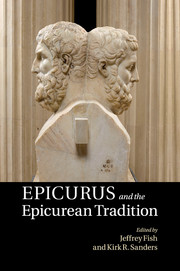Book contents
- Frontmatter
- Contents
- Acknowledgements
- Note on Abbreviations
- List of Contributors
- 1 Introduction
- 2 Autodidact and student: on the relationship of authority and autonomy in Epicurus and the Epicurean tradition
- 3 Epicurus' theological innatism
- 4 Epicurus on the gods
- 5 Not all politicians are Sisyphus: what Roman Epicureans were taught about politics
- 6 Epicurean virtues, Epicurean friendship: Cicero vs the Herculaneum papyri
- 7 Cicero's use and abuse of Epicurean theology
- 8 The necessity of anger in Philodemus' On Anger
- 9 Philodemus, Seneca and Plutarch on anger
- 10 Philodemus and the fear of premature death
- Bibliography
- General index
- Index of passages
1 - Introduction
Published online by Cambridge University Press: 01 June 2011
- Frontmatter
- Contents
- Acknowledgements
- Note on Abbreviations
- List of Contributors
- 1 Introduction
- 2 Autodidact and student: on the relationship of authority and autonomy in Epicurus and the Epicurean tradition
- 3 Epicurus' theological innatism
- 4 Epicurus on the gods
- 5 Not all politicians are Sisyphus: what Roman Epicureans were taught about politics
- 6 Epicurean virtues, Epicurean friendship: Cicero vs the Herculaneum papyri
- 7 Cicero's use and abuse of Epicurean theology
- 8 The necessity of anger in Philodemus' On Anger
- 9 Philodemus, Seneca and Plutarch on anger
- 10 Philodemus and the fear of premature death
- Bibliography
- General index
- Index of passages
Summary
The influential historiographer of philosophy Eduard Zeller, in his monumental Die Philosophie der Griechen, criticized the ‘philosophical sterility’ and ‘intellectual torpor’ of the Epicurean school, which, he claimed, remained more than any of its rivals confined throughout its history to the utterances of its founder. In his abridged Grundriß der Geschichte der griechischen Philosophie, Zeller went so far as to assert that none of Epicurus' successors ‘made any attempt worth mentioning’ to the development of the school's doctrines. A survey of much more recent histories of Hellenistic philosophy confirms that these stereotypes, which find antecedents already in antiquity, have proven persistent. As a consequence, studies of Epicurean philosophy remain disproportionately studies of Epicurus' philosophy. The present collection represents an attempt to help correct this imbalance and the misperceptions that sustain it. The essays contained herein explore various aspects of the interplay between tradition and innovation within Epicureanism.
That interplay begins with Epicurus himself, who was both heir to a rich philosophical tradition and the founder of a new philosophical school. The opening essay by Michael Erler, ‘Autodidact and student: on the relationship of authority and autonomy in Epicurus and the Epicurean tradition’, explores how Epicurus balanced these two contrasting roles. Critics both ancient and modern have viewed Epicurus' repeated, emphatic declarations of his own independence and originality as transparent attempts to mask the extent of his indebtedness to various predecessors.
- Type
- Chapter
- Information
- Epicurus and the Epicurean Tradition , pp. 1 - 8Publisher: Cambridge University PressPrint publication year: 2011



